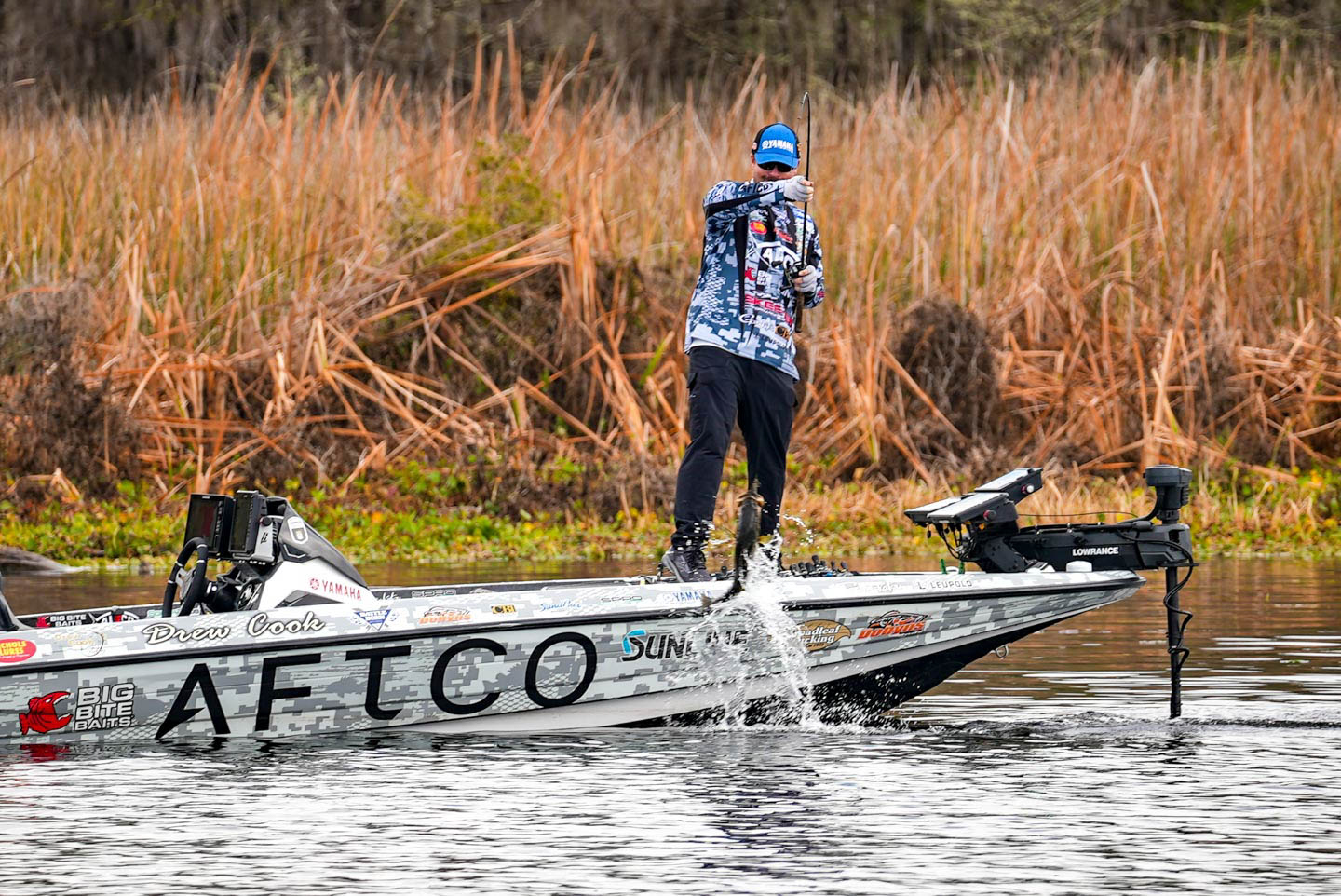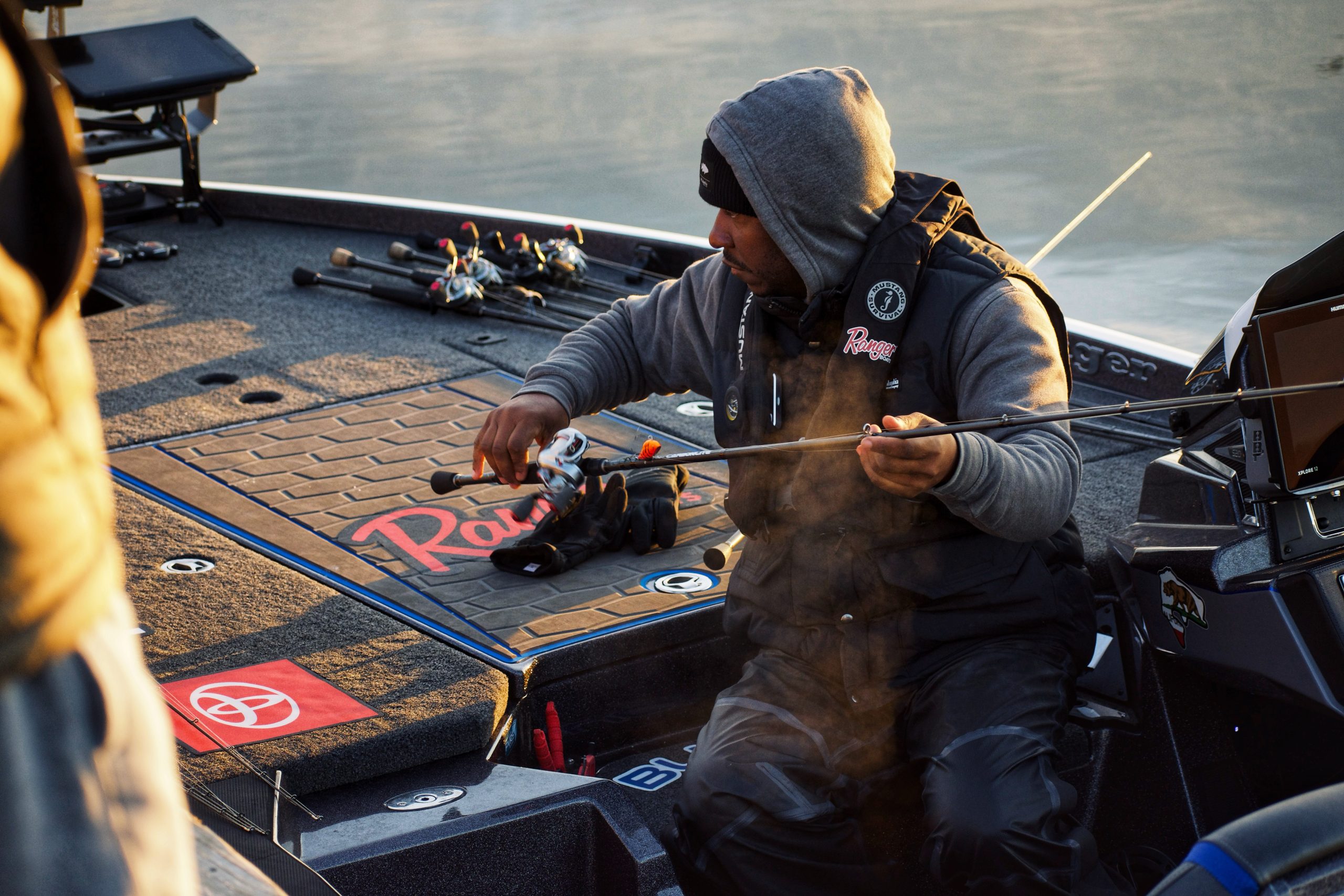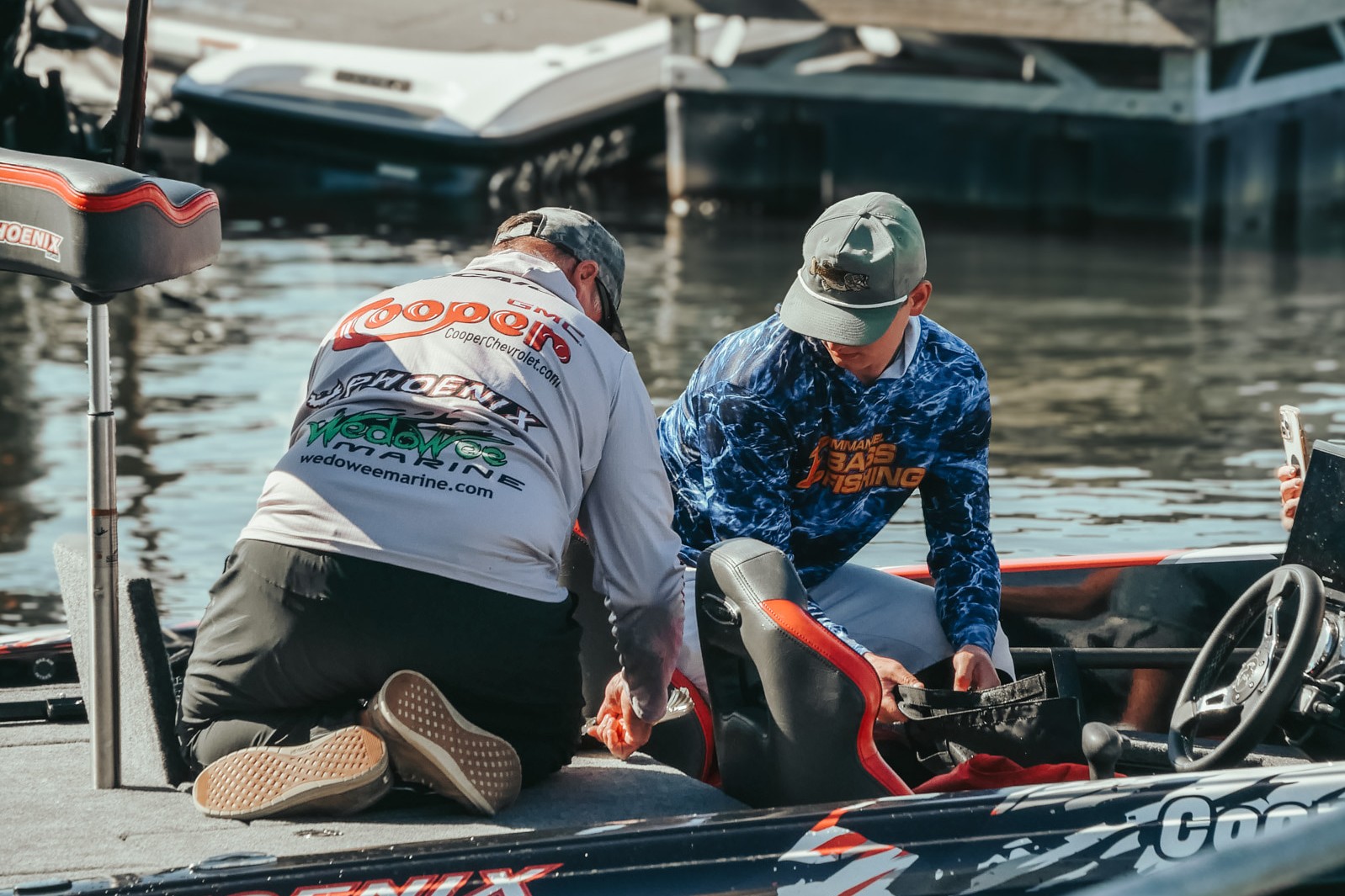Rebounding Seminole could deliver Bassmaster Elite Series fireworks
Bassmaster Elite Series champion Drew Cook, who grew up fishing Lake Seminole, will be among the field when the Bassmaster Elite Series heads to Bainbridge for the Gamakatsu Bassmaster Elite at Lake Seminole Feb. 23-26.
Photo by Kyle Jessie/B.A.S.S.
February 17, 2023
BAINBRIDGE, Ga. — Santee Cooper Lakes will forever hold a special place in Drew Cook’s heart; however, he’s expecting similar opportunities from the waters of his youth during the Gamakatsu Bassmaster Elite at Lake Seminole.
Competition days will be Feb. 23-26 with daily takeoffs from Earle May Boat Basin Park at 7:30 a.m. ET and weigh-ins each day back at the park at 3:30 p.m.
Cook notched his first Elite Series win last year on the Santee Cooper Lakes, an event that saw the South Carolina fishery give up two century belts (awarded for a four-day total of 100 pounds or more) — one for his win and another to second-place Caleb Kuphall. Having grown up fishing Seminole, Cook knows well this lake’s fireworks potential.
“It really would not surprise me at all if it took over 100 pounds to win,” Cook said. “Last year, the weights were really good all year. It took pretty much 30 pounds to win most of the team tournaments.
“The thing about Seminole is there’s not a lot of big bass — the 7- to 9-pounders — but there are so many 5- and 6-pounders that it truly is a phenomenal lake.”
Primarily located in Georgia, but also touching Alabama and Florida, the 37,500-acre Lake Seminole comprises the union of the Chattahoochee River on the west side with the Flint River on the east and Spring Creek in the middle. The smaller area known as “Fish Pond Drain” tucks between the Hooch and Spring Creek.
Below the Jim Woodruff Lock and Dam, which impounds the lake, Seminole’s water runs south to the Gulf of Mexico via the Apalachicola River. Despite its coastal connection, the dam prevents Seminole from experiencing any tidal influence.
Describing the habitat, Cook said the agricultural fields near the Flint keep that water dingy and receptive for moving baits, while Spring Creek’s extreme clarity could require a finesse touch with drop shots, Damiki rigs and the like. Cook said the Hooch usually has more of a chalky, greenish tint. All have hydrilla, milfoil and fishable emergents, while the Chattahoochee sports a lot of bank grass, spatterdock and reeds.
Cook said Seminole is rebounding well from a few down years, partly caused by heavy fishing pressure. With most major tournaments running out of the Flint River Arm, a lot of bass have been relocated. That’s no reflection of lake quality or fishing opportunity, but as Cook notes, it takes a while for released fish to redistribute to some of Seminole’s historically productive areas.
The most impactful event in recent years was 2018’s Hurricane Michael — the first Category 5 hurricane to make U.S. landfall since Andrew (1992) — which passed directly over Lake Seminole. Much of the lake’s standing timber was destroyed and submerged vegetation suffered severe damage.
“The Army Corps of Engineers dropped the lake because the storm was coming and that left a lot of grass exposed,” Cook said. “The wind and waves ripped a lot of grass out of the lake, but honestly, that was a good thing, because we had seen several warm winters and the grass hadn’t been dying back.
“So, that hurricane impact actually helped the lake a lot. It ripped up a lot of hydrilla and now there’s more milfoil in the lake than there was before the hurricane. There’s more milfoil now than I’ve ever seen.”
As Cook noted, the hurricane also cleared the way for new pad fields and pushed away silt to leave more of the clean hard bottom spawning bass prefer. On the downside, Seminole still has a lot of wood and storm debris clogging backwaters, so shallow-water navigation demands caution.
While he’s not ruling out the sight-fishing tactics that delivered his Santee Cooper win — a tactic Seminole is universally known for — Cook believes prespawn action will take center stage.
“You’re going to have to catch prespawn fish, whether it’s all prespawn or a mix to win,” he said. “You’re just so much more apt to catch one of those big 7- to 8-pounders in prespawn than bed fishing.”
Cook expects Seminole will see plenty of shallow-water flipping with various soft plastics like the Quarantine Craw he designed for Big Bite Baits. Anglers will also catch fish by punching heavier cover like hyacinth mats, while the usual mix of reaction baits will tempt those prespawners.
“You can pick your poison: A Northern guy can drop shot in Spring Creek, a Jason Christie can throw a spinnerbait in the Flint and an Alabama guy like Wes Logan can swim a jig in the Hooch,” Cook said. “The Flint is least sight-fishing friendly unless you get into some of the backwaters.”
Precisely how the event unfolds will depend on the weather. Partly sunny and warm is definitely possible, but this time of year, stable practice conditions could quickly yield to a postfrontal shutdown. While Cook said the Seminole bass are a heartier lot than the pure Florida-strain fish, largemouth in general do not like such changes.
“We’re in that very vulnerable time where it could be 30 degrees with a high of 50, or it could be 65 degrees with a high of 75 or 80,” Cook said. “That’s going to be the key factor on whether it’s going to take 23 to 25 pounds a day to win, or (if) it’s going to take 17 pounds a day to win.”
Notwithstanding unpredictable spring weather, Cook said he’s encouraged by what he calls ideal late-winter weather. Essentially, recent conditions have lined up well to spur the prespawn movement and prepare the bass for spawning activity; some of which could occur during the tournament.
“We’ve had exactly what I wanted,” Cook said. “I wanted a cold winter, and we had 19 days below freezing in this region. But we had 10 consecutive days of really cold weather in the teens to the 20s.
“That did good things to kill back some of the grass to position fish. Now we just need some sunshine and some help from Mother Nature.”
Cook believes the entire lake will be in play, but experience has shown him Seminole’s concentrated potential.
“A guy could definitely park in one area and win; it wouldn’t surprise me if that’s the way it’s won,” Cook said. “A guy could sit there and catch them for four days on one cast.
“The key will be noticing one of those areas. You really don’t know if you’re catching the tail end of something or the beginning. You have to just fish and see how they bite.”
Even though giant bass may be less common than what’s expected from the Elite season-opener on Lake Okeechobee the week prior, Cook said Seminole’s impressive population of quality fish will keep a lot of anglers in contention. In fact, he said the century belt requirement of 25-pound daily averages is no stretch.
Assessing the five-bass limit, Cook said Seminole definitely has the numbers.
“I have literally seen it where you can Power-Pole down and catch 100 5-pounders because they’re all swimming to you,” he said.
The full field of 104 pros will fish the first two days, with only the Top 50 advancing to Semifinal Saturday. After Saturday’s weigh-in, the Top 10 remaining pros will advance to Championship Sunday with a chance to claim the $100,000 first-place prize.
New for 2023, fans can enjoy predictions, conditions and live hits from the lake as part of the LIVE Preview show streaming on Bassmaster.comWednesday, Feb. 22 at 9 a.m. ET. Bassmaster LIVE kicks off tournament coverage Thursday and Friday mornings at 8 a.m. on Bassmaster.com, Tubi and the FOX Sports platforms while FS1 will broadcast live with the tournament leaders on Saturday and Sunday.













